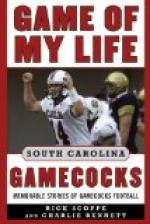Father did not show his grief for me as mother did, but he tried to comfort mother all he could, and at times would say to me, “Never mind, my son, you will be a man bye and bye,” but he did not know what was passing through my mind at that time. Though I was very small I thought that if, while a boy, my treatment was so severe, it would be much worse when I became a man, and having had a chance to see how men were being punished, it was a very poor consolation to me.
Finally the time came for us to go to bed, and we all knelt in family prayer. Father thanked God for having saved me from a worse injury, and then he prayed for mother’s comfort, and also for the time which he predicted would come, that is, the time of freedom, when I and the rest of the children would be our own masters and mistresses; then he commended us to God, and we all went to bed. The next morning I went to my work with a great deal of pain. They did not send me up the road with the horses in that condition, but I had to ride the old horses to water, and work around the stable until I was well enough to go with the other boys. But I am happy to say that from the time I got hurt by that horse I was never thrown except through carelessness, neither was I afraid of a horse after that.
Notwithstanding father and mother fretted very much about me, they were proud of my success as a rider, but my hardships did not end here.
A short time after, I was taken to Columbia and Charleston, S.C., where they used to have the races. That year Col. Singleton won a large sum of money by the well-known horse, Capt. Miner, and that was the same season that I rode my trial race. The next year, before the time of racing, Col. Singleton died at his summer seat. After master’s death, mistress sold all the race horses, and that put an end to sporting horses in that family.
I said that Boney Young, Col. Singleton’s groom, had a brother by the name of Charles, who trained horses for the colonel’s brother, John Singleton, Boney was a better trainer, but Charles was a better man to the negroes. It was against the law for a slave to buy spirituous liquors without a ticket, but Charles used to give the boys tickets to buy rum and whiskey with. He also allowed them to steal the neighbor’s cows and hogs.
I remember that on one occasion his boys killed a cow belonging to a man by the name of Le Brun; soon after the meat was brought to the stable, Le Brun rode up on horseback with a loaded shot gun and threatened to shoot the party with whom the beef was found. Of course the negroes’ apartments were searched; but as that had been anticipated, Mr. Young had made them put the meat in his apartment, and, as it was against the law of South Carolina for a white man to search another’s house, or any apartment, without very strong evidence, the meat was not found. Before searching among the negroes, Mr. Young said to Le Brun, “You may search, but you won’t find your beef here, for my boys don’t steal.” Le Brun answered, “Mr. Young, your word might be true, sir, but I would trust a nigger with money a great deal sooner than I would with cows and hogs.” Mr. Young answered, “That might be true, but you won’t find your beef here.”




